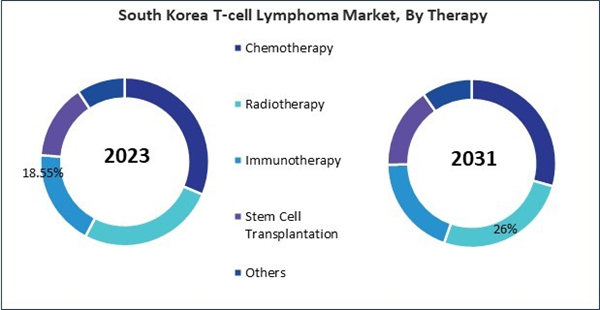The China market dominated the Asia Pacific T-cell Lymphoma Market by Country in 2023, and would continue to be a dominant market till 2031; thereby, achieving a market value of $276.6 million by 2031. The Japan market is registering a CAGR of 8.4% during (2024 - 2031). Additionally, The India market would showcase a CAGR of 9.8% during (2024 - 2031).
Multidisciplinary supportive care teams address patient needs, including pain management, nutritional support, psychosocial counseling, and symptom control, to improve quality of life. Evaluating novel agents, combination therapies, and treatment modalities is essential for these lymphoma patients to enhance outcomes and broaden therapeutic options. Participation in clinical trials is essential for this purpose.
Adopting and utilizing strategies for managing these lymphomas in healthcare settings are crucial aspects that influence patient outcomes, treatment efficacy, and overall healthcare delivery. Clinical trial data demonstrating efficacy, safety profiles, and comparative effectiveness against existing standards of care often guide the adoption of new treatments in these lymphomas. Consensus guidelines from professional organizations help standardize treatment protocols and support adoption decisions.
The growth of the hospital sector in India leads to the establishment of specialized oncology departments and comprehensive cancer centers across the country. These facilities offer state-of-the-art diagnostic capabilities and multidisciplinary treatment options for these lymphomas, including medical oncology, radiation oncology, and stem cell transplantation. As per the Investment Promotion and Facilitation Agency, in FY21, the hospital sector in India recorded revenue of INR 7.94 trillion and is projected to grow to INR 18.34 trillion by FY27. Presently, the diagnostics sector in India is assessed to be worth $4 billion. The organized sector occupies almost 25% of this segment (15% in laboratories and 10% in radiology). The expansion of the hospital sector facilitates increased access to innovative therapies for these lymphomas in India. This includes the availability of targeted therapies, immunotherapies, and participation in clinical trials investigating novel treatment approaches that can potentially enhance treatment outcomes and patient survival rates. In conclusion, rising hospital sector and high rates of the non-Hodgkin lymphoma is driving the growth of the market.
Based on Type, the market is segmented into Peripheral (Cutaneous T-cell Lymphoma, Anaplastic Large Cell Lymphoma, Angio-immuno-blastic T-cell Lymphoma, and Others) and Lymphoblastic. Based on Therapy, the market is segmented into Chemotherapy, Radiotherapy, Immunotherapy, Stem Cell Transplantation, and Others. Based on countries, the market is segmented into China, Japan, India, South Korea, Singapore, Malaysia, and Rest of Asia Pacific.
List of Key Companies Profiled
- Bristol Myers Squibb Company
- Daiichi Sankyo Company, Limited
- Eisai Co., Ltd
- Acrotech Biopharma Inc. (Aurobindo Pharma USA)
- Shenzhen Chipscreen Biosciences Co., Ltd.
- Citius Pharmaceuticals, Inc.
- Genor Biopharma Co. Ltd.
- Innate Pharma SA
- Dizal Pharmaceutical Co. Ltd.
Market Report Segmentation
By Type- Peripheral
- Cutaneous T-cell Lymphoma
- Anaplastic Large Cell Lymphoma
- Angio-immuno-blastic T-cell Lymphoma
- Others
- Lymphoblastic
- Chemotherapy
- Radiotherapy
- Immunotherapy
- Stem Cell Transplantation
- Others
- China
- Japan
- India
- South Korea
- Singapore
- Malaysia
- Rest of Asia Pacific
Table of Contents
Companies Mentioned
- Bristol Myers Squibb Company
- Daiichi Sankyo Company, Limited
- Eisai Co., Ltd
- Acrotech Biopharma Inc. (Aurobindo Pharma USA)
- Shenzhen Chipscreen Biosciences Co., Ltd.
- Citius Pharmaceuticals, Inc.
- Genor Biopharma Co. Ltd.
- Innate Pharma SA
- Dizal Pharmaceutical Co. Ltd.









